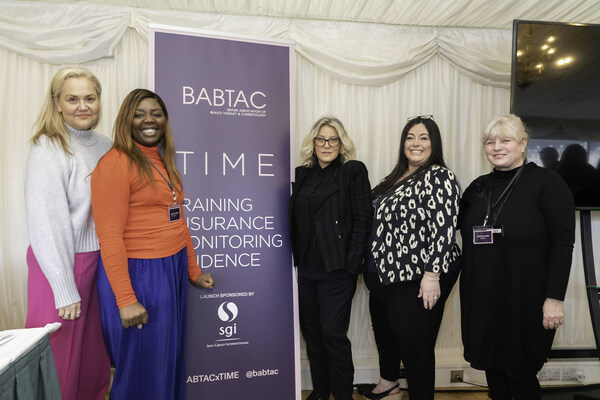#EnglandPeachy #ProductAlert BABTAC (British Association of Beauty Therapy & Cosmetology) launches T.I.M.E
An initiative to to help consumers signpost their way to salon safety
Currently, lack of legislation in the UK beauty industry means there is nothing to stop someone with little or no training from establishing themselves as a seemingly professional therapist.

BABTAC launches consumer safety initiative T.I.M.E at the Houses of Parliament, supported by beauty industry experts such as Caroline Hirons and Millie Kendall OBE
BABTAC ran a consumer survey* to determine their understanding of the state of regulation and training standards of the beauty industry, for which the results were very concerning with only 38% aware that it isn't regulated. Beauty Backed ran a further comparison survey**, revealing that 56% still believed the industry was regulated. These results are a stark reminder of how low consumer awareness remains about the lack of regulation and standardisation of qualifications and training.
A similar number of consumers from both surveys believed that their therapists held relevant qualifications (70%), although very tellingly over 90% would not feel comfortable asking to see their therapists' qualifications, and 71% stated they didn't know the difference between a regulated qualification and a non-regulated short course. Most notably, almost all consumers from both surveys believed that the industry should be regulated and that there should be a recognisable certification applied to fit for purpose training.
So how can consumers be sure that the training a therapist has received is fit for purpose?
BABTAC launched its T.I.M.E initiative at the Houses of Parliament supported by several influential bodies and key figures, including industry icon Caroline Hirons, Millie Kendall OBE of the British Beauty Council, skincare expert Dija Ayodele, and Skin Group International Founder Candice Glanville.
A regulatory checklist, T.I.M.E will provide the framework necessary to ensure that consumers are aware of what to be mindful of when booking a service with a beauty therapist.TRAINING – What training and qualifications, including continual professional development (CPD) do you and all your staff have?
INSURANCE – Are you insured and who by?
MONITORING – Do you carry out important pre and post appointment processes such as patch tests, consultations and aftercare?
EVIDENCE – Can you provide certified proof of training and insurance and client testimonials?
Lesley Blair MBE, Chair at BABTAC says, "We're so pleased to be launching the TIME initiative, as lack of regulation in our industry means that consumers are being exposed to potentially unsafe situations all too often, and so we've seen a wave of 'botched' beauty treatments in recent years as a result. This regulatory checklist aims to serve as a simple but effective reminder for consumers to help them choose evidence-based, professional fit for purpose services, whilst minimising any risk."
Caroline Hirons, industry expert, and founder of Beauty Backed Trust says, "The TIME initiative is launching at such an important time for the beauty industry. After a difficult two years, we've seen hundreds of beauty professionals and businesses approach the Beauty Backed Trust for support with accessing training or help getting back on their feet. The TIME initiative will help to elevate this valuable industry, whilst empowering consumers to understand how to safely identify trained professionals when choosing their treatments."
Millie Kendall OBE, founder and CEO of the British Beauty Council says, "It's worrying that such a high percentage of consumers are completely unaware that the beauty industry remains largely unregulated and demonstrates the need for a widespread education. We're pleased to be supporting the TIME initiative, which will help inform consumers on what they should be looking for when choosing a treatment, the questions they should be asking their therapist, and the potential implications that can arise when seeking services from unqualified individuals."
*2000 respondents surveyed
** Beauty Backed survey of 1,134 respondents




































































































